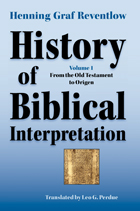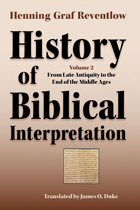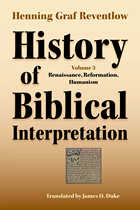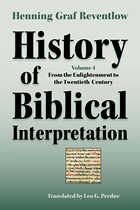4 books about Reventlow, Henning Graf

History of Biblical Interpretation, Volume 1
From the Old Testament to Origen
Henning Graf Reventlow
SBL Press, 2009
From the very beginning, Holy Scripture has always been interpreted Scripture, and its interpretation determined the development and the history of both early Judaism and the first centuries of the Christian church. In this volume, the first of four on the History of Biblical Interpretation, readers will discover how the earliest interpreters of the Bible made the Scriptures come alive for their times—within the contexts and under the influences of Hellenism, Stoicism, and Platonism, as well as the interpretive methods developed in Alexandria. Particular attention is paid to innerbiblical interpretation (within the Hebrew Bible itself and in the New Testament’s reading of the Hebrew Bible), as well as to the interpretive practices reflected in the translation of the Septuagint and the writings of Qumran, Philo, the early rabbis, the apostolic fathers Barnabas and Clement, and early Christian leaders such as Justin Martyr, Marcion, Irenaeus, and Origen.
[more]

History of Biblical Interpretation, Volume 2
From Late Antiquity to the End of the Middle Ages
Henning Graf Reventlow
SBL Press, 2010
Volume 2 of History of Biblical Interpretation deals with the most extensive period under examination in this four-volume set. It begins in Asia Minor in the late fourth century with Bishop Theodore of Mopsuestia, the founder of a school of interpretation that sought to accentuate the literal meaning of the Bible and thereby stood out from the tradition of antiquity. It ends with another outsider, a thousand years later in England, who by the presuppositions of his thought stood at the end of an era: John Wyclif. In between these two interpreters, this volume presents the history of biblical interpretation from late antiquity until the end of the Middle Ages by examining the lives, works, and interpretive practices of Didymus the Blind, Jerome, Ambrose, Augustine, Gregory the Great, Isidore of Seville, the Venerable Bede, Alcuin, John Scotus Eriugena, Abelard, Rupert of Deutz, Hugo of St. Victor, Joachim of Fiore, Thomas Aquinas, Bonaventure, Rashi, Abraham ibn Ezra, and Nicolas of Lyra.
[more]

History of Biblical Interpretation, Volume 3
Rennaissance, Reformation, Humanism
Henning Graf Reventlow
SBL Press, 2009
Volume 3 of History of Biblical Interpretation deals with an era—Renaissance, Reformation, and humanism—characterized by major changes, such as the rediscovery of the writings of antiquity and the newly invented art of printing. These developments created the context for one of the most important periods in the history of biblical interpretation, one that combined both philological insights made possible by the now-accessible ancient texts with new theological impulses and movements. As representative of this period, this volume examines the lives and teaching of Johann Reuchlin, Erasmus, Martin Luther, Philipp Melanchthon, John Calvin, Thomas Müntzer, Hugo Grotius, and a host of other influential exegetes.
[more]

History of Biblical Interpretation, Volume 4
From the Englightenment to the Twentieth Century
Henning Graf Reventlow
SBL Press, 2010
As in the first three volumes of History of Biblical Interpretation, From the Enlightenment to the Twentieth Century surveys the lives and works of significant theologians and lay people, politicians and philosophers, in order to portray the characteristic attitudes of the era. It discusses the philosophers and politicians Hobbes, Locke, and Spinoza and the writers Lessing and Herder. Biblical criticism per se begins with the controversy over the original Hebrew text of the Old Testament and extends into Enlightenment ethics, myth, and miracle stories. Early representatives include Richard Simon and Hermann Samuel Reimarus, followed by Johann Salomo Semler, Johann Jakob Griesbach, Johann Gottfried Eichhorn, and Philipp Jacob Spener. Biblical scholars such as Wilhelm Martin Leberecht de Wette, Ferdinand Christian Baur, Heinrich Julius Holtzmann, Julius Wellhausen, Hermann Gunkel, Wilhelm Bousset, Karl Barth, and Rudolf Bultmann round out the volume and bring readers to the twentieth century.
[more]
READERS
Browse our collection.
PUBLISHERS
See BiblioVault's publisher services.
STUDENT SERVICES
Files for college accessibility offices.
UChicago Accessibility Resources
home | accessibility | search | about | contact us
BiblioVault ® 2001 - 2024
The University of Chicago Press









